25-Professionally Crafted Letters to Applicant Who Do Not Qualify for the Job
Welcome to our platform! We’re thrilled to have you on board for this exciting journey. Our team is passionate about delivering exceptional results and creating customized solutions that perfectly fit your unique needs. We genuinely care about going above and beyond to exceed your expectations and ensure your utmost satisfaction. With our extensive expertise, innovative mindset, and ability to adapt to the ever-changing business landscape, we stay at the forefront of industry trends and advancements. Whether you’re seeking our services, products, or guidance, you can count on us for unwavering support and to be your trusted partners every step of the way. Let’s work together to achieve your goals, unlock new opportunities, and make amazing things happen. Join us now and let the adventure begin!
Expert Team: Qualifications and Expertise
- Company Overview: Provide a brief introduction to your company, highlighting its mission, values, and unique selling points.
- Services or Products: Detail the specific services or products you offer, focusing on their benefits and how they cater to customer needs.
- Client Testimonials: Include testimonials or reviews from satisfied clients to showcase your track record of delivering excellent results and customer satisfaction.
- Team Expertise: Highlight the expertise and qualifications of your team members, emphasizing their skills and experience relevant to the services or products you offer.
- Case Studies or Success Stories: Share real-life examples of successful projects or clients you have worked with, demonstrating the tangible impact of your services or products.
- Industry Insights: Provide valuable insights and thought leadership on industry trends, challenges, and best practices, showcasing your knowledge and positioning your company as a trusted authority.
- Contact Information: Make it easy for visitors to get in touch with you by providing clear contact information, such as phone number, email address, and social media handles.
- Call-to-Action: Include a clear call-to-action to encourage visitors to take the desired action, such as contacting you for a consultation, signing up for a newsletter, or making a purchase.
- Frequently Asked Questions (FAQs): Anticipate common questions and address them in an FAQ section to provide clarity and ease visitors’ concerns.
- Company Culture and Values: Share information about your company culture, values, and commitment to customer satisfaction to help potential customers align with your brand.
#1: Unmatched Qualifications:
I understand that there may be a mismatch between my qualifications and the specific requirements mentioned in the job description, and I want to take a moment to explain this further. While I realize that my qualifications may not perfectly align with what you’re looking for, I genuinely believe that my skills and experiences can bring significant value to the role. My background is quite diverse, and it has provided me with a solid foundation in [mention relevant skills or knowledge]. Even though these skills may not directly match the job requirements, they are versatile and adaptable, allowing me to tackle the responsibilities and challenges that come with the position. Moreover, I am truly passionate about [mention relevant field or industry], and I have a genuine eagerness to learn and grow. I am confident that my ability to quickly adapt, combined with my passion, can make a valuable contribution to your organization.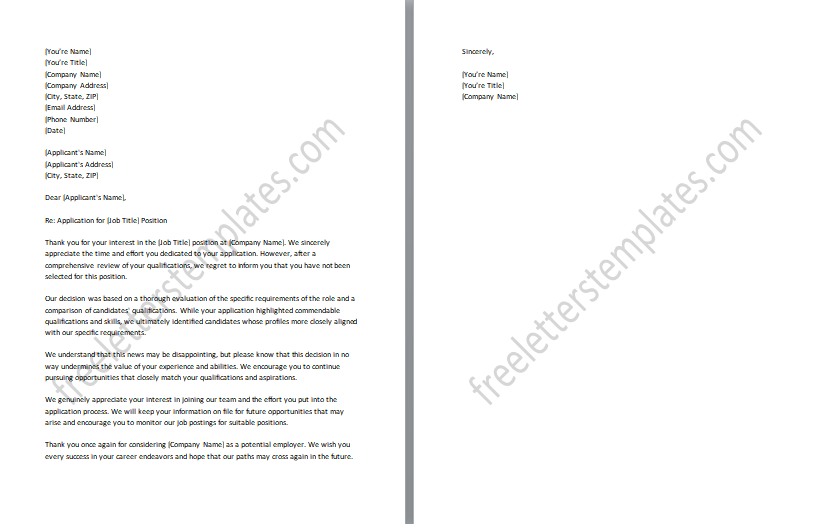
#2: Lack of Experience:
I would like to provide a brief explanation regarding the lack of experience outlined in my application and its relevance to the position. While I acknowledge that my experience may not meet the level required for the role as stated in the job description, I believe that my skills, capabilities, and potential compensate for any shortfall in direct experience. Throughout my career, I have consistently demonstrated a strong ability to learn quickly and adapt to new environments. My [mention relevant skills or knowledge] have equipped me with a solid foundation that can be applied to the responsibilities and demands of the position. I am confident that with my determination, drive, and willingness to invest time and effort, I can rapidly acquire the necessary expertise and excel in the role.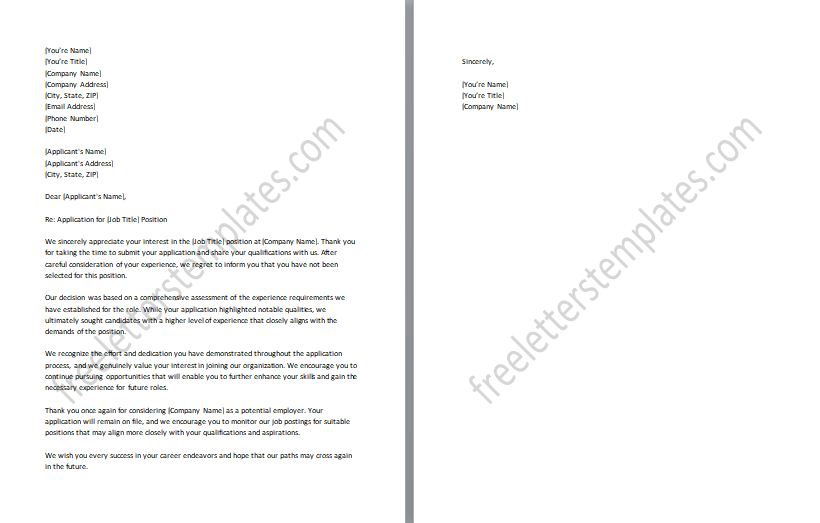
#3: Insufficient Education:
A letter explaining the insufficient education can be used in various scenarios, such as job applications, scholarship or grant applications, or when seeking educational opportunities. The purpose of the letter is to address the concern raised about the educational background not meeting the minimum requirements for a specific opportunity. The paragraph can serve as an explanation to highlight other qualifications, skills, or experiences that make the candidate a strong fit for the role, despite the educational shortfall. It aims to demonstrate the candidate’s potential, willingness to learn, and ability to contribute effectively to the position or opportunity at hand.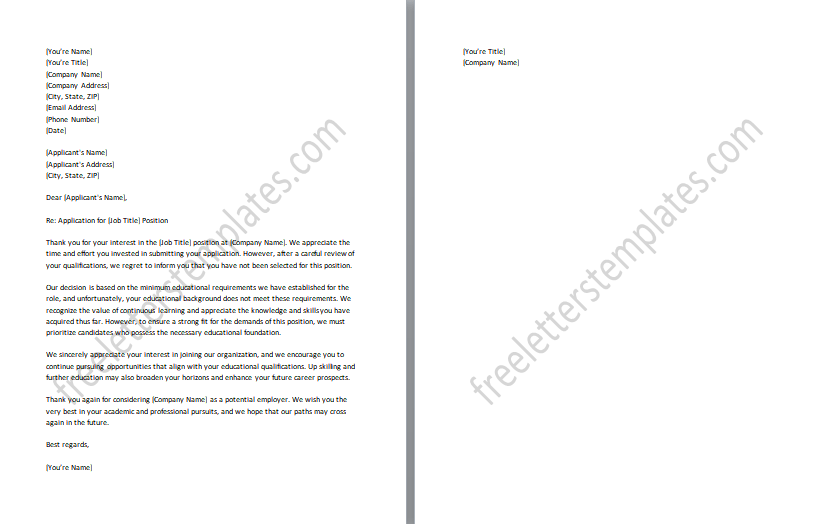
#4: Stronger Candidates Identified:
A letter stating that stronger candidates have been identified can be used in the context of a job application or recruitment process. The purpose of this letter is to inform the recipient that, after careful consideration and evaluation of all applicants, other candidates have been identified whose qualifications and experience more closely align with the requirements of the role. The letter aims to communicate that the decision-making process has been thorough and that the organization is moving forward with candidates who are better suited to fulfill the responsibilities and expectations of the position.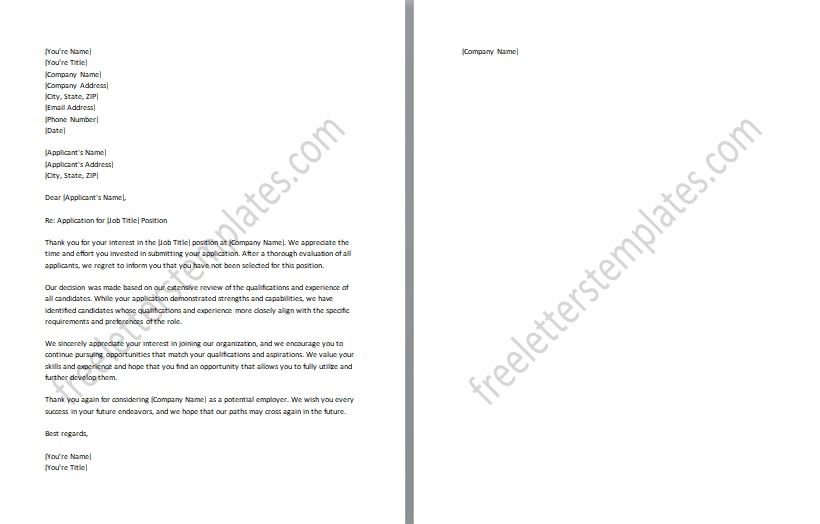
#5: Skill Set Mismatch:
A letter addressing a skill set mismatch can be used in situations where an individual’s skills do not align with the key skills required for a specific position. The purpose of this letter is to explain to the recipient that, upon reviewing their qualifications and skill set, it has been determined that their skills do not directly match the key skills needed for the position. The letter aims to provide transparency and clarity regarding the decision, while also expressing appreciation for the applicant’s interest and effort. It may further offer encouragement to explore other opportunities where their skills may be a better fit and highlight the importance of continued skill development and growth.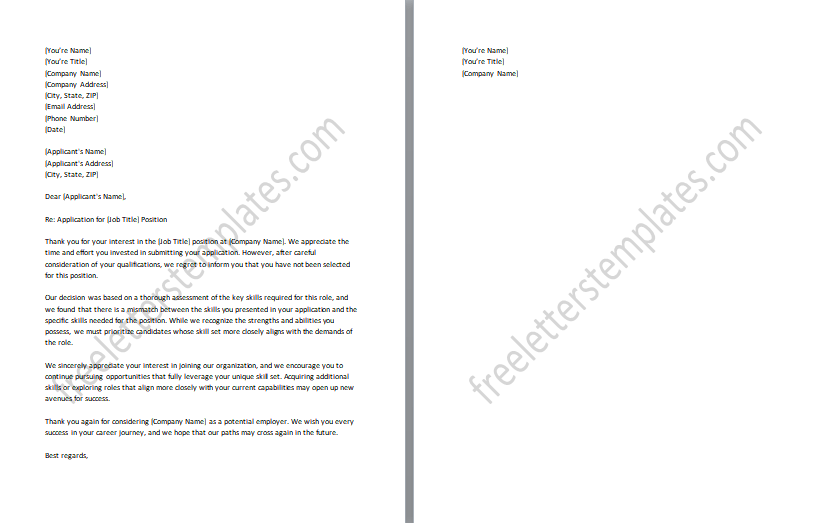
#6: Limited Industry Knowledge:
A letter addressing limited industry knowledge can be used to communicate to an individual that their knowledge of the industry or sector is not deemed sufficient for the role they have applied for. The purpose of this letter is to explain that, upon reviewing their qualifications and assessing their industry knowledge, it has been determined that their current level of understanding may not meet the specific requirements of the role. The letter aims to provide transparency and clarity while expressing appreciation for their interest and effort. It may further encourage the individual to seek opportunities to expand their industry knowledge through further education, training, or gaining relevant experience in order to enhance their prospects for future roles within the industry.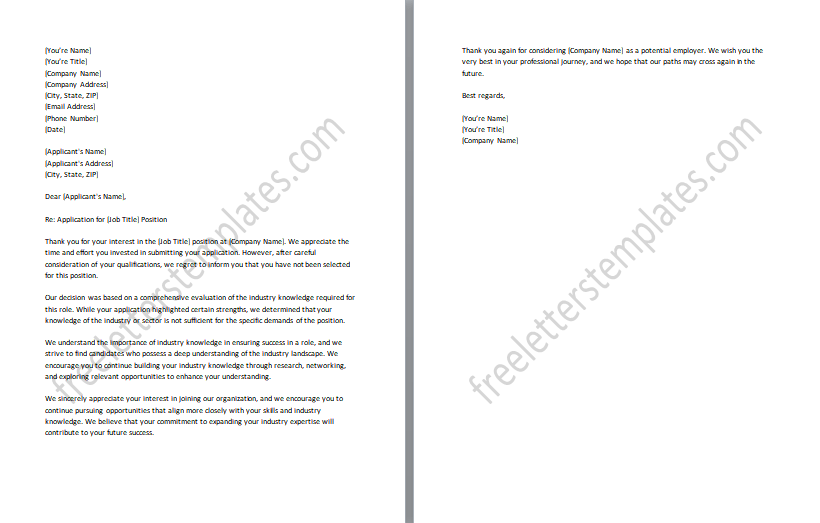
#7: Overqualified for the Position:
A letter addressing being overqualified for a position can be used to inform an individual that their qualifications and experience exceed the level required for the specific role they have applied for. The purpose of this letter is to explain that, upon reviewing their credentials, it has been determined that their qualifications surpass the requirements of the position. The letter aims to provide transparency and clarity while expressing appreciation for their interest and effort. It may further acknowledge their valuable skills and encourage them to explore other opportunities that align better with their level of expertise, allowing them to make a more significant impact and utilize their full potential.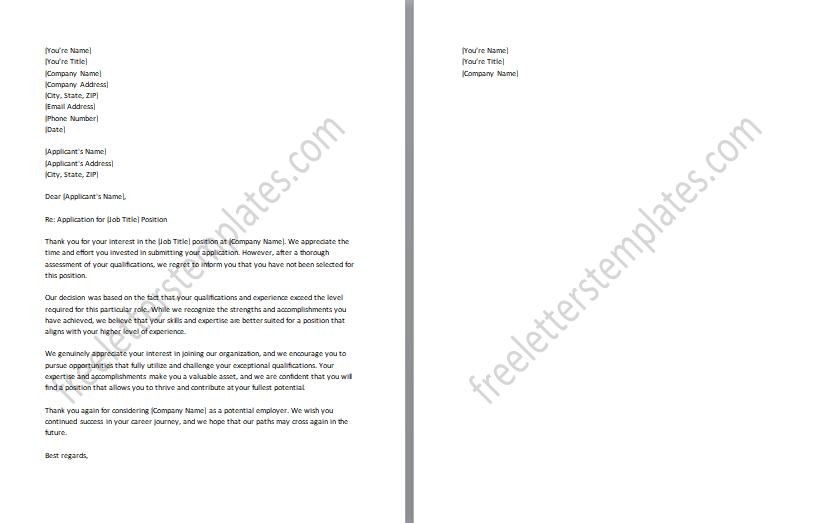
#8: Lack of Specific Technical Skills:
A letter addressing a lack of specific technical skills can be used to inform an individual that they do not possess the particular technical skills required for a specific position. The purpose of this letter is to explain that, after reviewing their qualifications and assessing their technical skill set, it has been determined that they do not meet the specific technical requirements of the role. The letter aims to provide transparency and clarity while expressing appreciation for their interest and effort. It may further encourage them to continue developing their technical skills through training, certifications, or gaining practical experience in order to enhance their prospects for future positions that require those specific skills.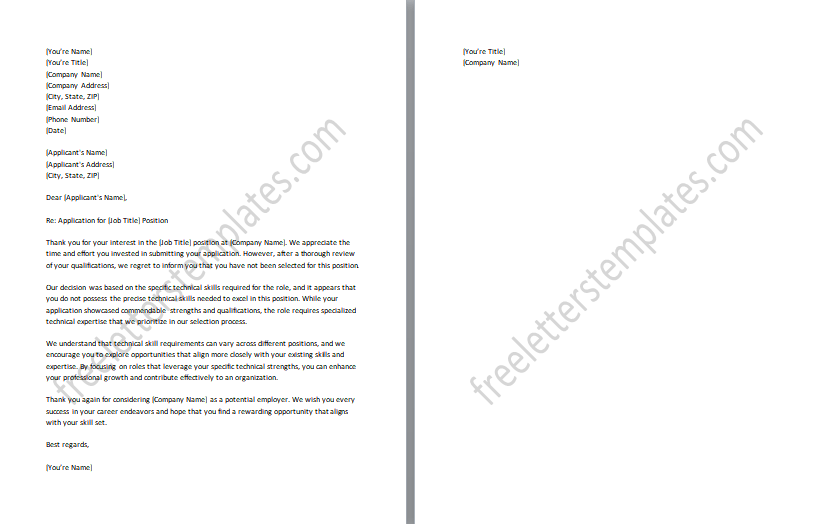
#9: Cultural Fit Concerns:
A letter addressing concerns about cultural fit can be used to express to an individual that there are concerns regarding their alignment with the company culture based on their application. The purpose of this letter is to communicate that, upon reviewing their qualifications and assessing their fit with the company values, there are concerns about their compatibility with the organizational culture. The letter aims to provide transparency and clarity while expressing appreciation for their interest and effort. It may further encourage the individual to reflect on the company’s values and culture and consider how they can better align themselves with those principles in future endeavors.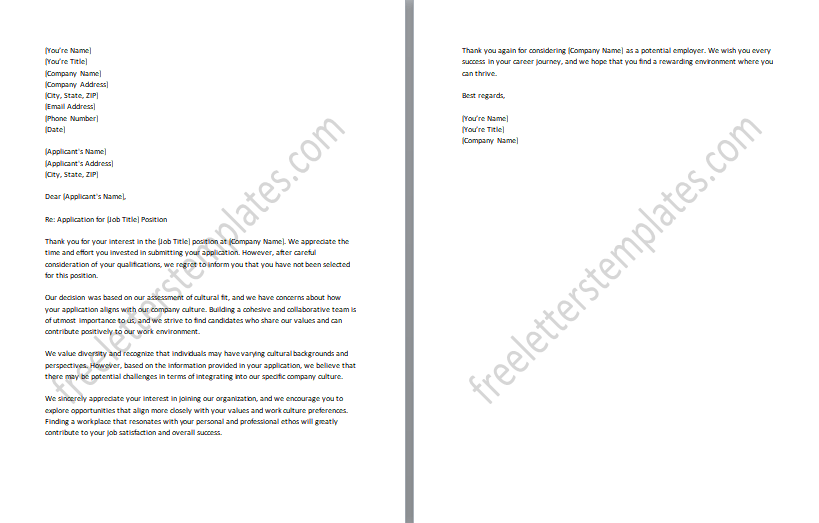
#10: Inadequate Communication Skills:
A letter addressing inadequate communication skills can be used to inform an individual that their communication skills, as demonstrated in their application, do not meet the requirements of the position. The purpose of this letter is to explain that, upon reviewing their application, it has been determined that their communication skills may not meet the desired standards for effective communication within the organization. The letter aims to provide transparency and clarity while expressing appreciation for their interest and effort. It may further encourage them to focus on enhancing their communication skills through practice, professional development, or seeking opportunities that can help them improve their ability to effectively convey ideas and collaborate with others.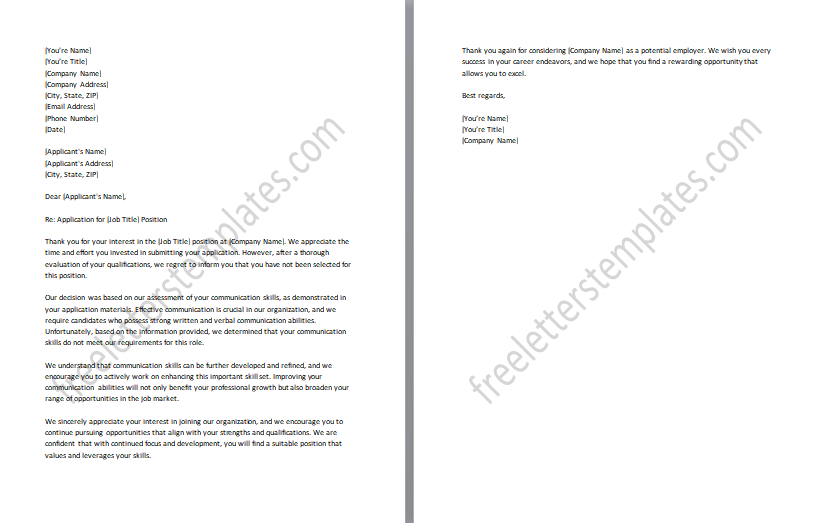
#11: Poor Interview Performance:
A letter addressing poor interview performance can be used to inform an individual that their performance during the interview did not meet the expectations of the hiring team or organization. The purpose of this letter is to provide feedback and communicate that, based on the evaluation of their interview, their performance did not align with the desired criteria for the position. The letter aims to provide transparency and clarity while expressing appreciation for their interest and effort. It may further encourage them to reflect on their interview performance, identify areas for improvement, and consider seeking feedback or resources to enhance their interviewing skills for future opportunities.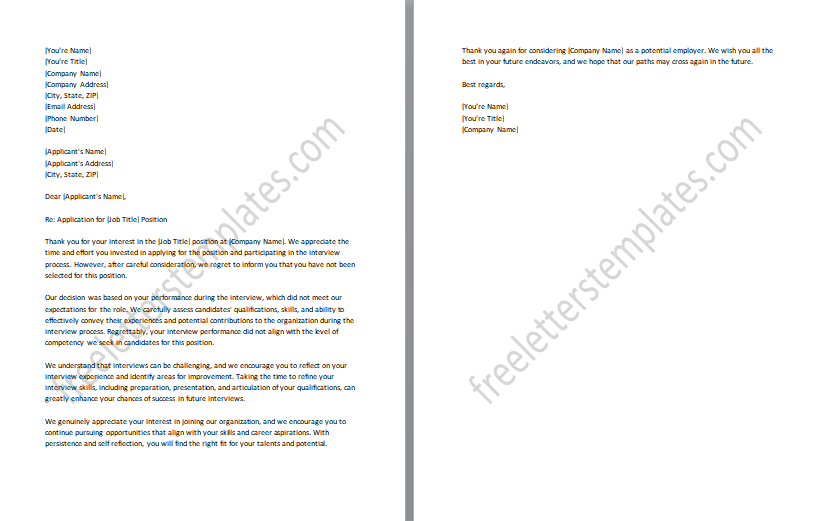
#12: Limited Availability:
A letter addressing limited availability can be used to inform an individual that their availability does not align with the required schedule or timeframe for the position they have applied for. The purpose of this letter is to communicate that, after considering their application and availability, it has been determined that their schedule or timeframe does not meet the requirements of the position. The letter aims to provide transparency and clarity while expressing appreciation for their interest and effort. It may further encourage them to explore other opportunities that better align with their availability or suggest alternative options, such as part-time or flexible positions, that may be a better fit for their current schedule.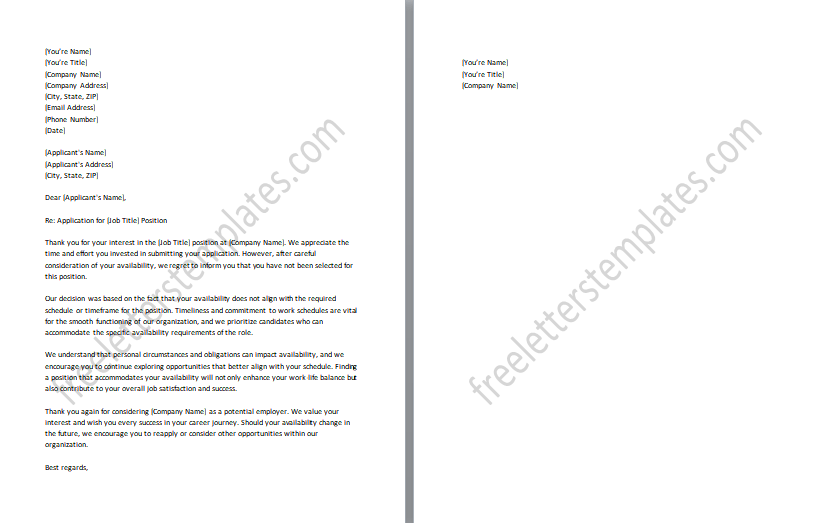
#13: Incomplete Application:
A letter addressing an incomplete application can be used to inform an individual that their application was missing the necessary information or supporting documents required for the evaluation process. The purpose of this letter is to communicate that, upon reviewing their application, it was found to be incomplete and lacked essential information or documentation. The letter aims to provide transparency and clarity while expressing appreciation for their interest and effort in applying for the position. It may further encourage them to review the application requirements and resubmit a complete application if they are still interested in being considered for the opportunity. Additionally, it may provide guidance on any specific documents or information that were missing from the initial submission.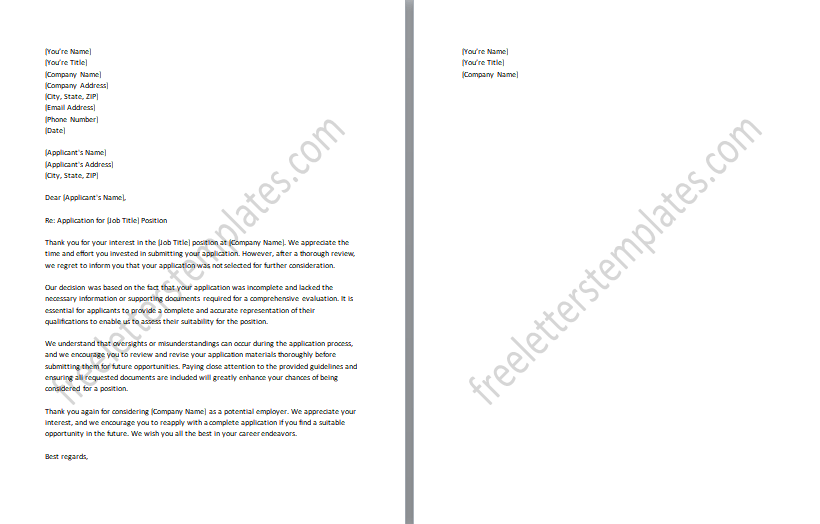
#14: Employment Gap:
A letter addressing concerns about an employment gap can be used to express to an individual that there are concerns regarding a significant gap in their employment history. The purpose of this letter is to communicate that, upon reviewing their application and employment history, there are concerns about the extended period without employment. The letter aims to provide transparency and clarity while expressing appreciation for their interest and effort. It may further encourage the individual to address the employment gap in their application or during the interview process, providing an opportunity to explain the circumstances surrounding the gap, any relevant activities or experiences during that period, and how they have maintained or developed their skills and knowledge during that time.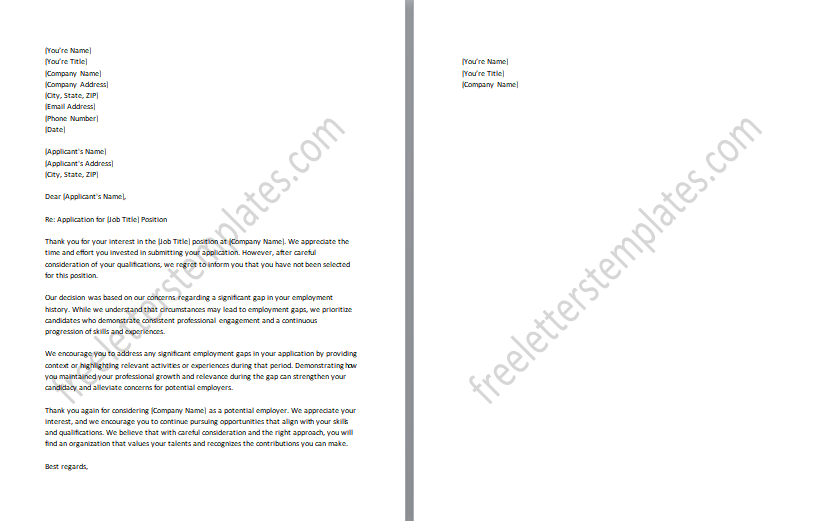
#15: Lack of Professional References:
A letter addressing a lack of professional references can be used to inform an individual that they did not provide sufficient professional references to support their application. The purpose of this letter is to communicate that, upon reviewing their application, it has been determined that there is a lack of professional references, which are essential for evaluating their qualifications and suitability for the position. The letter aims to provide transparency and clarity while expressing appreciation for their interest and effort. It may further encourage the individual to submit additional professional references or reach out to individuals who can speak to their professional abilities and character to strengthen their application.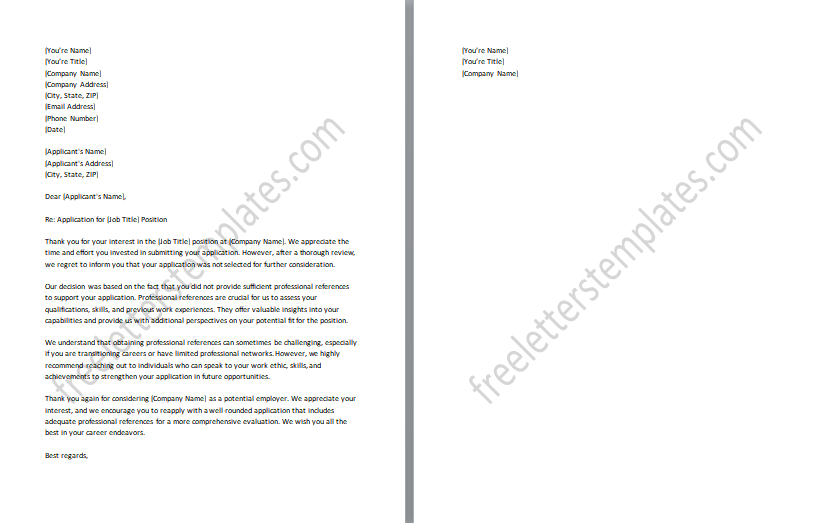
#16: Salary Expectation Misalignment:
A letter addressing salary expectation misalignment can be used to inform an individual that their salary expectations are not aligned with the budget set for the position they have applied for. The purpose of this letter is to communicate that, after considering their application and reviewing their salary expectations, it has been determined that there is a misalignment between their desired salary and the allocated budget for the position. The letter aims to provide transparency and clarity while expressing appreciation for their interest and effort. It may further encourage the individual to consider whether they would be open to discussing alternative compensation options or exploring opportunities that may better align with their salary expectations.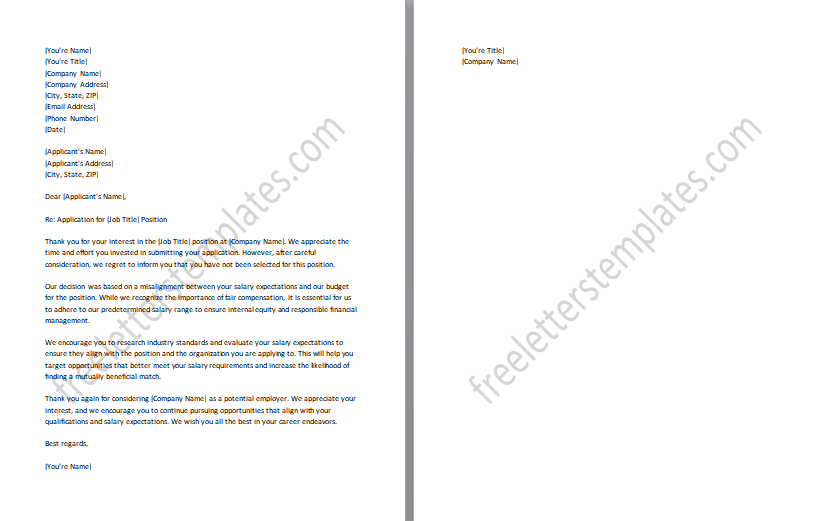
#17: Geographic Constraints:
A letter addressing geographic constraints can be used to inform an individual that their location or willingness to relocate does not meet the requirements of the position they have applied for. The purpose of this letter is to communicate that, after reviewing their application, it has been determined that their current location or unwillingness to relocate does not align with the needs of the organization for the specific position. The letter aims to provide transparency and clarity while expressing appreciation for their interest and effort. It may further encourage the individual to consider opportunities that are more geographically suitable or to explore possibilities for remote work or relocation if they are open to it.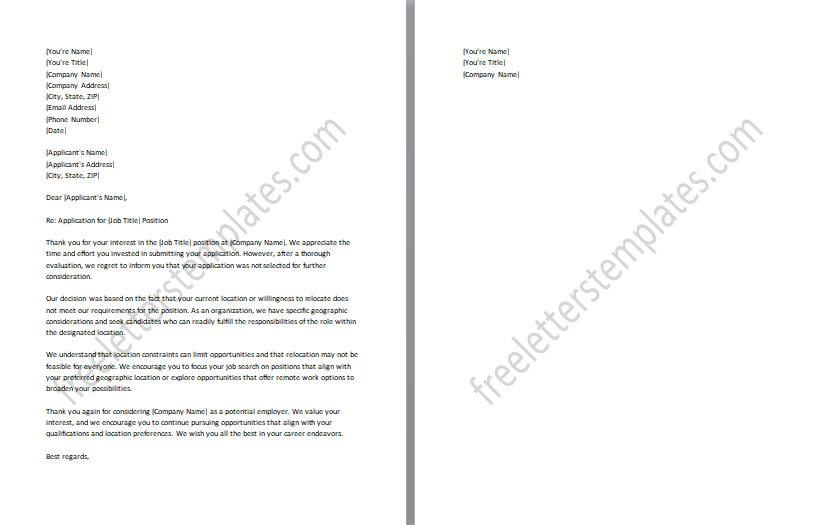
#18: Limited Teamwork Skills:
A letter addressing limited teamwork skills can be used to inform an individual that their application does not demonstrate strong teamwork or collaboration abilities. The purpose of this letter is to communicate that, upon reviewing their application, it has been determined that their demonstrated teamwork skills or collaboration abilities may not meet the expectations for the position. The letter aims to provide transparency and clarity while expressing appreciation for their interest and effort. It may further encourage the individual to reflect on their teamwork skills, consider experiences or examples that highlight their ability to work effectively in a team, and seek opportunities to further develop and showcase their collaboration skills in future endeavors.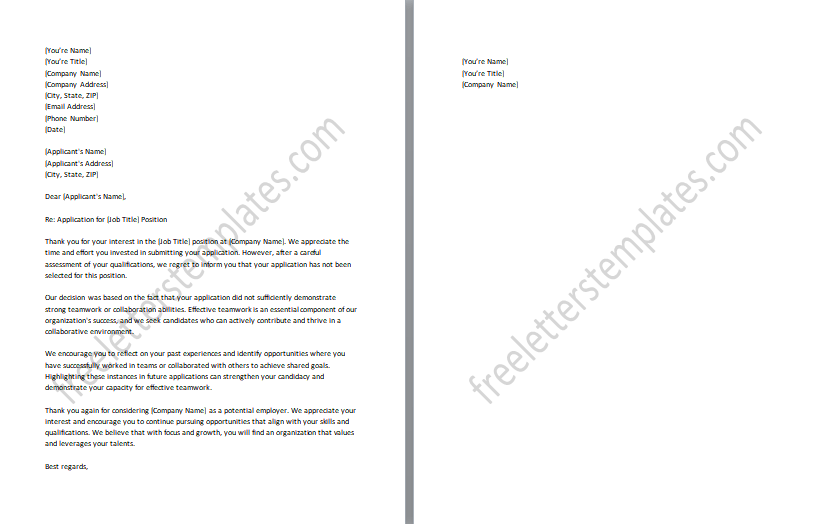
#19: Lack of Leadership Experience:
A letter addressing a lack of leadership experience can be used to inform an individual that the level of leadership experience they possess does not match the requirements for the position they have applied for. The purpose of this letter is to communicate that, upon reviewing their application, it has been determined that their demonstrated leadership experience may not meet the expectations for the position. The letter aims to provide transparency and clarity while expressing appreciation for their interest and effort. It may further encourage the individual to consider opportunities to gain additional leadership experience, such as taking on leadership roles in volunteer activities or seeking out professional development programs, to enhance their prospects for future leadership positions.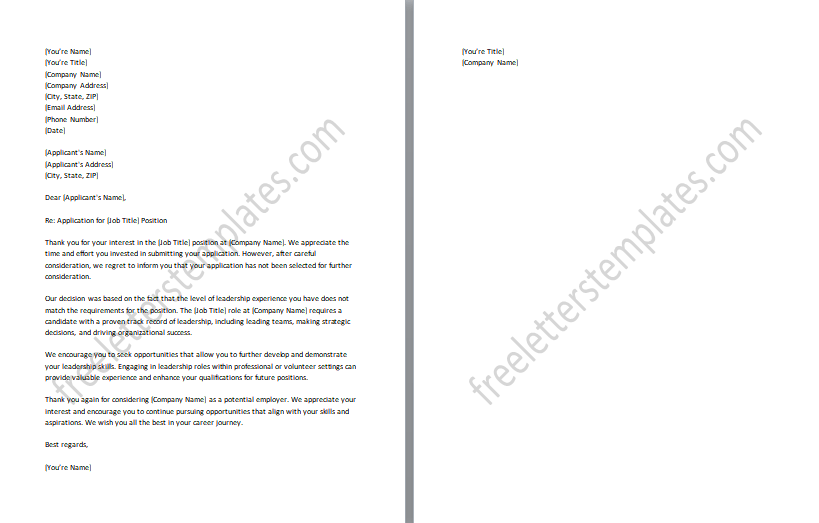
#20: Inadequate Problem-Solving Skills:
A letter addressing inadequate problem-solving skills can be used to inform an individual that their application did not sufficiently demonstrate strong problem-solving abilities. The purpose of this letter is to communicate that, upon reviewing their application, it has been determined that their demonstrated problem-solving skills may not meet the expectations for the position. The letter aims to provide transparency and clarity while expressing appreciation for their interest and effort. It may further encourage the individual to reflect on their problem-solving abilities, consider specific examples or experiences that highlight their problem-solving skills, and seek opportunities to further develop and showcase their problem-solving capabilities in future endeavors. Additionally, it may suggest resources or training programs that can assist in enhancing their problem-solving skills.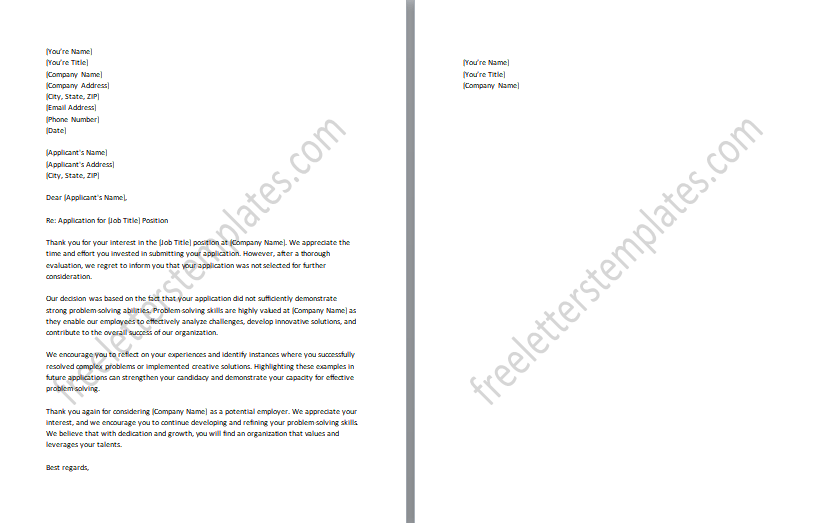
#21: Regulatory or Certification Requirement:
A letter addressing a regulatory or certification requirement can be used to inform an individual that they do not meet specific regulatory or certification requirements necessary for the role they have applied for. The purpose of this letter is to communicate that, upon reviewing their application, it has been determined that they do not possess the required regulatory licenses or certifications that are necessary for the position. The letter aims to provide transparency and clarity while expressing appreciation for their interest and effort. It may further encourage the individual to explore opportunities to obtain the required certifications or licenses, suggesting relevant training programs or resources that can assist them in meeting the necessary regulatory requirements for similar roles in the future.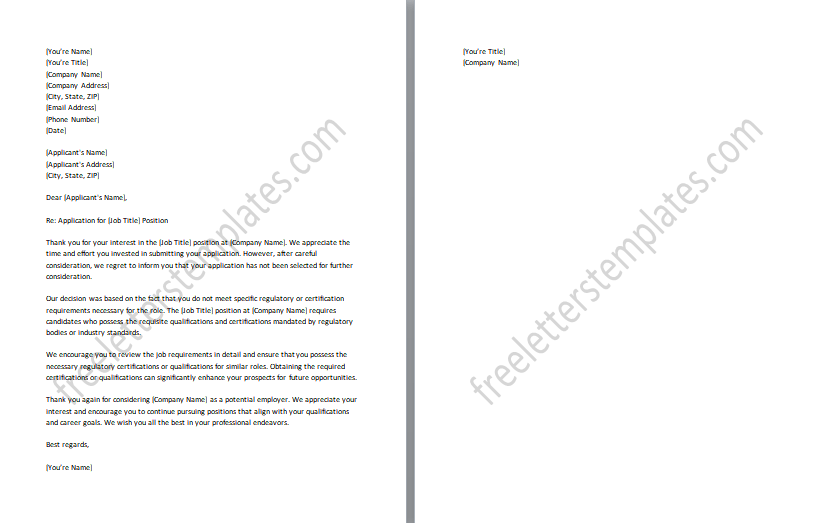
#22: Lack of Industry-Specific Knowledge:
A letter addressing a lack of industry-specific knowledge can be used to inform an individual that their knowledge of industry-specific trends and practices is insufficient for the position they have applied for. The purpose of this letter is to communicate that, upon reviewing their application, it has been determined that their understanding of industry-specific knowledge, including current trends and practices, may not meet the expectations for the position. The letter aims to provide transparency and clarity while expressing appreciation for their interest and effort. It may further encourage the individual to actively pursue opportunities for professional development, such as attending industry conferences, obtaining relevant certifications, or seeking mentorship, in order to enhance their industry-specific knowledge and increase their competitiveness for similar roles in the future.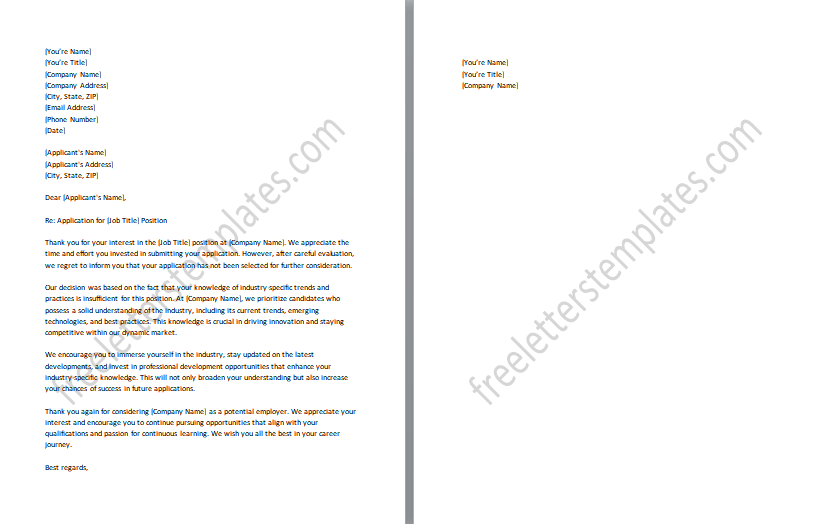
#23: Inadequate Professional Development:
A letter addressing inadequate professional development can be used to express concerns about an individual’s commitment to ongoing professional development. The purpose of this letter is to communicate that, upon reviewing their application, there are concerns regarding their demonstrated efforts in continuously developing their professional skills and knowledge. The letter aims to provide transparency and clarity while expressing appreciation for their interest and effort. It may further encourage the individual to reflect on their commitment to professional growth, highlighting the importance of staying updated with industry advancements, seeking out learning opportunities, and actively engaging in ongoing development to enhance their professional capabilities. Additionally, it may suggest resources, such as workshops, courses, or professional networks, that can support their efforts in ongoing professional development.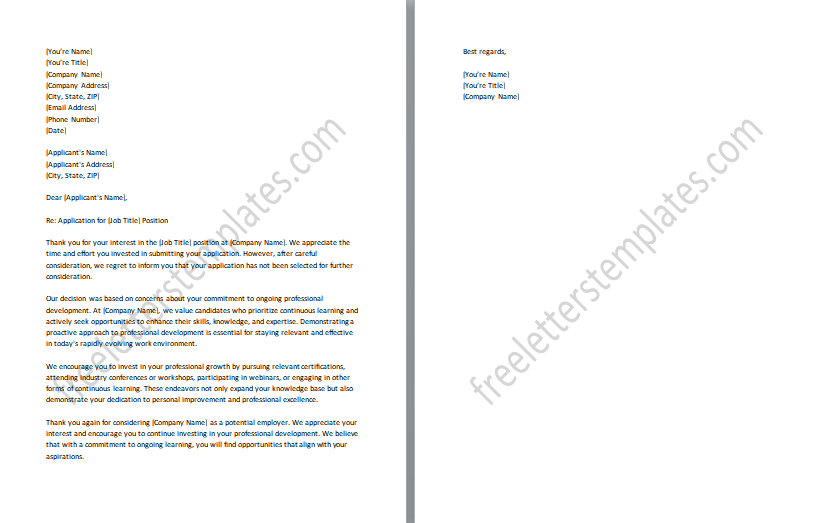
#24: Limited Software Proficiency:
A letter addressing limited software proficiency can be used to inform an individual that their proficiency with required software tools falls below the expected level for the position they have applied for. The purpose of this letter is to communicate that, upon reviewing their application, it has been determined that their demonstrated proficiency with the required software tools does not meet the expectations for the role. The letter aims to provide transparency and clarity while expressing appreciation for their interest and effort. It may further encourage the individual to actively seek opportunities to enhance their software proficiency, such as online courses, tutorials, or practical experience, in order to strengthen their skills and increase their competitiveness for similar positions in the future. Additionally, it may suggest specific resources or training programs that can assist them in improving their software proficiency.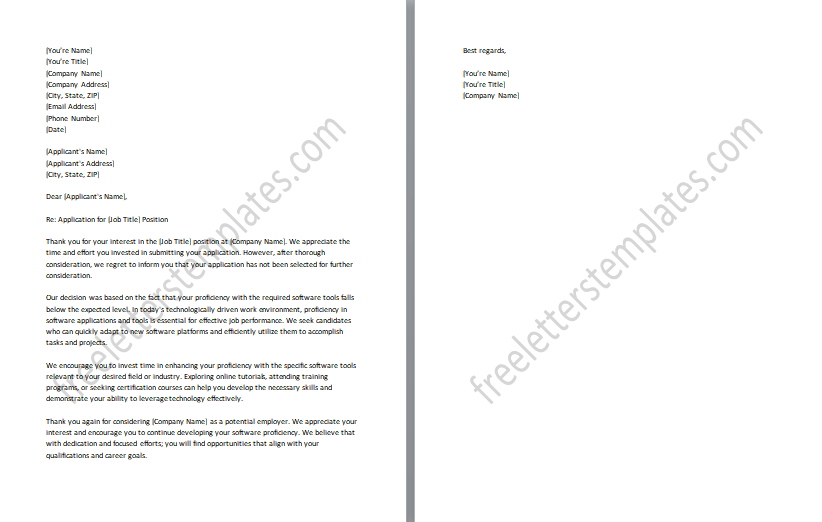
#25: Role Reallocated or Eliminated:
A letter addressing a reallocated or eliminated position can be used to inform an individual that, due to internal changes within the organization, the position they applied for has been either reallocated or eliminated. The purpose of this letter is to communicate that, upon reviewing their application, it has been determined that the original position is no longer available. The letter aims to provide transparency and clarity while expressing appreciation for their interest and effort. It may further express regret for any inconvenience caused and encourage the individual to consider other available opportunities within the organization, if applicable, or explore external job openings that align with their qualifications and career goals.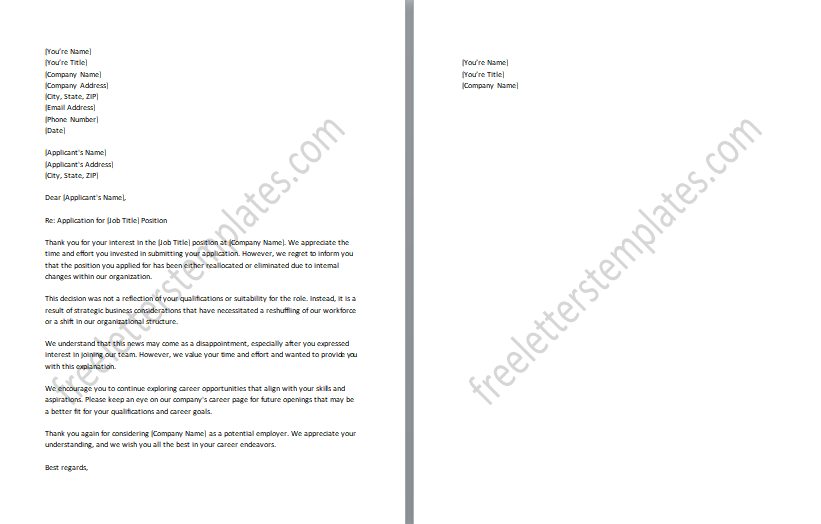
Our Commitment to Excellence
In closing, our team is truly passionate about delivering exceptional results and tailoring solutions to perfectly fit your needs. We genuinely care about exceeding your expectations and ensuring your utmost satisfaction. With our extensive expertise, innovative mindset, and adaptability to change, we stay ahead of the game in this ever-evolving business landscape. Whether you need our services, products, or guidance, we’re here to support you and be a part of your continued success. So, why wait? Reach out to us today and let’s embark on this journey together, achieving your goals and unlocking new opportunities along the way.